Bamboo Vs Silk Sheets
When choosing between bamboo and silk sheets, you'll find distinct advantages with each material. Bamboo sheets offer superior moisture-wicking capabilities, absorbing 40% more moisture than cotton, while providing natural antibacterial properties and temperature regulation. They're also more durable, lasting 8-10 years, and typically cost less ($50-$150) than silk options. Silk sheets ($150-$500) excel in smoothness and luxury feel but require more careful maintenance and typically last only 2-5 years. While both materials are hypoallergenic, bamboo's eco-friendly production process and lower maintenance requirements make it a more practical choice for most sleepers. Understanding these materials' unique characteristics will help inform your investment in better sleep.
This post may contain affiliate links. If you make a purchase through these links, I may earn a commission at no additional cost to you. Additionally, portions of this post may be generated using artificial intelligence (AI) technology. While we strive for accuracy, please be aware that AI-generated content may not always be perfect and should be fact-checked when necessary.
The Spatula Scoops
- Bamboo sheets are more durable, lasting 8-10 years, while silk sheets typically need replacement every 2-5 years.
- Bamboo sheets are easier to maintain, being machine-washable, while silk requires delicate hand washing or special care.
- Bamboo sheets cost $50-$150 and offer better value, compared to silk sheets ranging from $150-$500.
- Bamboo provides superior moisture-wicking and temperature regulation, while silk can trap heat and moisture.
- Bamboo sheets have stronger antimicrobial and hypoallergenic properties than silk, making them better for allergy sufferers.
Understanding Common Bed Sheet Materials
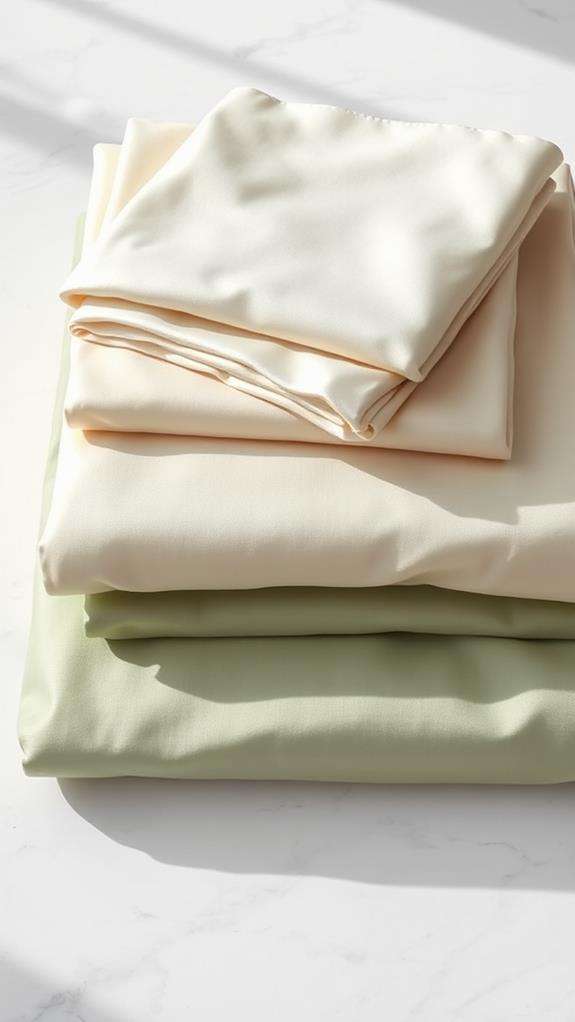
Choosing the right bed sheet material can dramatically impact your sleep quality and comfort. When you're exploring bedding options, you'll find several materials that each offer distinct advantages and potential drawbacks for your sleeping environment.
You'll encounter traditional materials like cotton, which excels at moisture absorption but might leave your skin feeling somewhat dry. Linen, while incredibly durable, presents a textural challenge that isn't ideal for everyone. When it comes to premium options, silk bedding stands out for its friction-reducing properties that protect both skin and hair, though you'll need to commit to special care instructions to maintain its quality.
Bamboo sheets have gained significant popularity, offering a compelling combination of softness and breathability that works especially well if you tend to sleep hot. Unlike some traditional materials, bamboo bedding provides natural hypoallergenic properties that make it suitable for sensitive skin. When you're comparing materials, you'll want to evaluate how each option aligns with your specific needs, whether that's temperature regulation, skin sensitivity, or maintenance requirements. Understanding these fundamental differences will help you make an informed decision about which material best suits your sleeping preferences.
Benefits of Natural Fibers
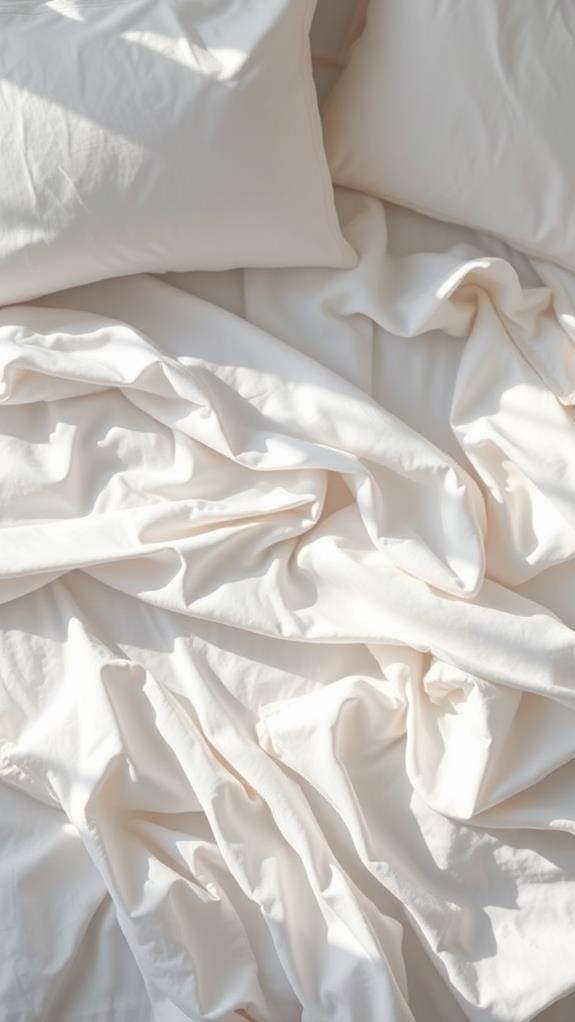
Both bamboo and silk fibers work with your body's natural moisture levels, keeping you comfortable by wicking away excess sweat while maintaining ideal hydration for your skin. You'll find these natural materials particularly beneficial if you're prone to allergies or skin sensitivities, as bamboo's antimicrobial properties and silk's hypoallergenic nature create an environment that's remarkably free from common irritants. Their natural temperature-regulating abilities mean you'll stay cool in summer and cozy in winter, adapting to your body's changing needs throughout the night.
Moisture Control Properties
The moisture control properties of bamboo and silk sheets play a vital role in your sleep quality. When you're choosing between these two materials, you'll find that bamboo sheets offer superior moisture-wicking properties, absorbing up to 40% more moisture than traditional cotton. This remarkable absorption capacity means you'll stay dry and comfortable throughout your sleep cycle, even during warm nights.
While both materials help maintain your skin's moisture balance, they handle excess moisture differently. Bamboo's unique fiber structure creates microscopic gaps that enhance airflow, allowing moisture to evaporate efficiently while regulating your body temperature. You'll appreciate how bamboo's hypoallergenic properties work alongside its moisture control to create a healthier sleeping environment, particularly if you're sensitive to allergens.
In contrast, silk sheets, despite their luxury appeal, don't manage moisture quite as effectively. Their tightly woven structure tends to retain some moisture, which might leave you feeling less comfortable if you're a hot sleeper. While silk does offer some moisture-retaining benefits for your skin and hair, it can't match bamboo's superior ability to wick away excess moisture while maintaining ideal comfort levels.
Allergy-Free Sleep Experience
For allergy sufferers, natural fiber bedding can make the difference between restless nights and peaceful sleep. When you're choosing between bamboo and silk sheets, understanding their hypoallergenic properties can help you make an informed decision for your health needs.
Bamboo sheets stand out with their superior moisture-wicking capabilities and natural resistance to allergens. You'll find that bamboo's dense fiber structure creates a barrier against dust mites and mold, while its environmentally friendly production process guarantees you're making a sustainable choice. While silk offers some protection, it's not as thorough or long-lasting as bamboo's built-in defenses.
| Feature | Bamboo | Silk |
|---|---|---|
| Allergen Resistance | High, permanent | Moderate, diminishing |
| Moisture Control | Excellent wicking | Good, less effective |
| Long-term Benefits | Maintains properties | Requires more care |
You'll experience fewer allergy symptoms with bamboo sheets because they actively work to maintain a cleaner sleep environment. Their ability to regulate humidity while resisting common allergens makes them particularly effective for those with respiratory sensitivities or skin conditions. Unlike silk, bamboo's protective qualities don't degrade considerably over time.
Temperature Regulation Benefits
Searching for the perfect temperature balance in bedding? Understanding the temperature regulation capabilities of different bedding materials can make a notable difference in your sleep quality. When it comes to bamboo versus silk sheets, bamboo clearly takes the lead in keeping you comfortable throughout the night.
You'll find that bamboo's exceptional moisture-wicking properties work tirelessly to regulate your body temperature, drawing excess heat and sweat away from your skin. The breathable structure of bamboo fibers creates an efficient ventilation system, allowing air to circulate freely while you sleep. This natural temperature control means you won't experience the uncomfortable heat retention that's common with silk sheets.
While silk might feel luxurious, its tightly woven structure can trap warmth against your body, potentially disrupting your sleep if you're prone to overheating. If you're a hot sleeper or deal with night sweats, you'll appreciate bamboo's year-round adaptability. The fabric keeps you cool during summer nights and comfortably warm in winter, maintaining an ideal sleeping temperature regardless of the season. This consistent temperature regulation can notably improve your overall sleep experience.
The Production Process
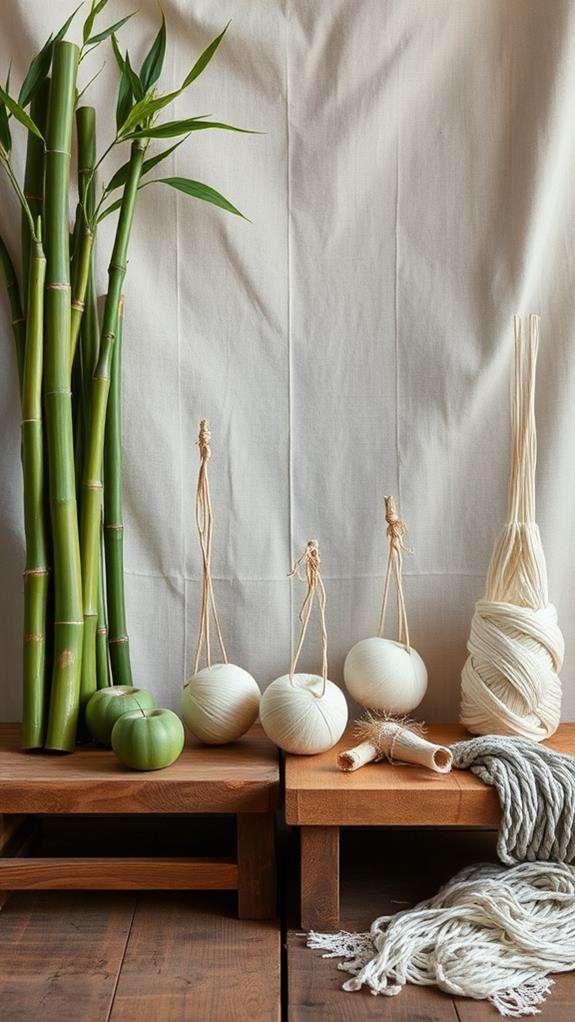
When comparing bamboo and silk sheets, you'll find two distinctly different production processes. Bamboo sheets start with crushing bamboo canes into bamboo pulp, which then undergoes either an eco-friendly lyocell process or a chemical-heavy viscose treatment. The lyocell method stands out because it's a closed-loop system that recycles solvents, making it a more sustainable choice for environmentally conscious consumers.
| Process Aspect | Bamboo | Silk |
|---|---|---|
| Raw Material | Bamboo canes | Silkworm cocoons |
| Processing Method | Lyocell or viscose | Manual unwinding |
| Environmental Impact | Varies by method | Labor-intensive |
Silk production takes a different approach, requiring thousands of silkworm cocoons to create just one piece of bedding. You'll find that traditional silk harvesting raises ethical concerns, though ahimsa silk offers a more humane alternative by allowing silkworms to emerge naturally before harvesting their cocoons. While both materials demand careful handling during production, silk's delicate nature and intensive labor requirements typically result in higher costs. Understanding these production differences can help you make an informed decision about which type of sheets aligns with your values and budget.
Environmental Impact and Sustainability
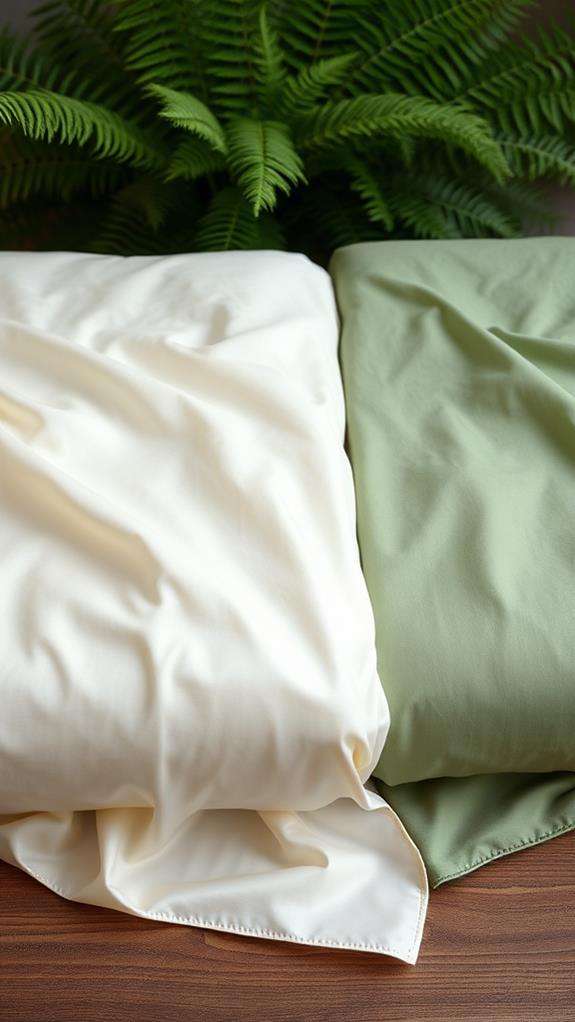
The environmental footprint of your bedding choice extends far beyond the production process. When you're comparing bamboo and silk sheets, you'll find considerable differences in their ecological impact that might influence your purchasing decision.
If you're environmentally conscious, you'll appreciate that bamboo grows at remarkable speeds – up to 35 inches daily – while requiring minimal agricultural intervention. The bamboo lyocell production process uses a closed-loop system that recycles water and chemicals, considerably reducing waste and environmental harm. When your bamboo sheets eventually wear out, they'll naturally biodegrade, leaving minimal impact on landfills.
In contrast, silk's environmental credentials aren't as impressive. Traditional silk production involves killing silkworms to harvest their cocoons, raising ethical concerns for conscious consumers. Additionally, silk farming contributes to a higher carbon footprint compared to bamboo cultivation. You're looking at more intensive farming practices and resource consumption throughout the silk production cycle.
Care and Maintenance
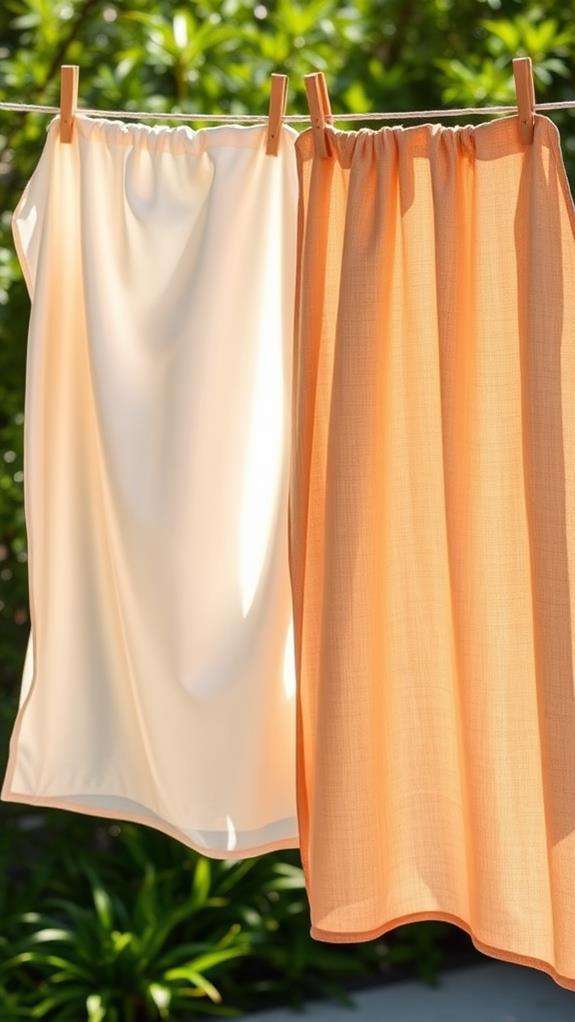
Maintaining your luxury sheets properly can considerably impact their longevity and performance. When it comes to care and maintenance, bamboo sheets and silk sheets require distinctly different approaches to guarantee they retain their quality over time.
You'll find bamboo sheets relatively easy to maintain, as they're machine-washable and can handle gentle cycles with cold water. While you shouldn't use bleach or fabric softeners, regular washing actually helps enhance their softness. You can conveniently tumble dry them on low heat, making the entire cleaning process straightforward and time-efficient.
Silk sheets, however, demand more attention and careful handling. You'll need to either hand wash them with specialized detergent or use your washing machine's coldest, gentlest cycle. When it comes to drying, you can't simply toss silk sheets in the dryer – they require air-drying or flat-laying to prevent damage to their delicate fibers. Unlike bamboo sheets that become softer with regular washing, silk's maintenance focuses on preservation rather than enhancement. The extra care required for silk sheets means you'll need to dedicate more time and attention to their upkeep, but proper maintenance will help preserve their luxurious qualities.
Cost Analysis and Value
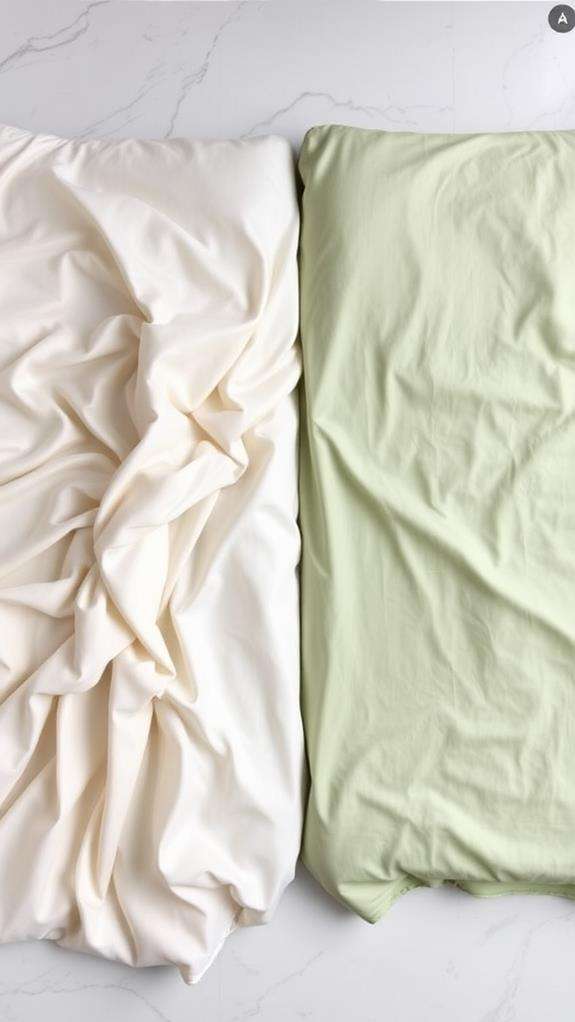
When you're comparing bamboo and silk sheets, you'll notice a substantial difference in initial investment, with bamboo sets typically costing $50-$150 while silk commands $150-$400 or more for queen-size options. You'll appreciate that bamboo sheets offer remarkable value through their durability and easy maintenance, lasting several years with proper care while maintaining their quality. Your long-term savings become even more apparent when you consider that silk sheets often require replacement sooner and come with higher maintenance costs, making bamboo the more budget-friendly choice for luxury bedding.
Initial Investment Comparison
Comparing initial costs between bamboo and silk sheets reveals a significant price difference that can impact your bedding budget. You'll find bamboo sheets typically priced between $50 and $150, while silk sheets command a premium range of $150 to $500 or more, depending on the brand and quality you choose.
When you're evaluating your investment, it's vital to take into account both the upfront costs and long-term value. The production process greatly influences these price points – silk's labor-intensive manufacturing requires approximately 12,000 silkworm cocoons for a single comforter, driving up costs considerably. In contrast, bamboo sheets, particularly those crafted from lyocell, utilize more efficient production methods that keep prices lower without sacrificing quality.
You'll want to factor in the lifespan of your investment as well. While silk sheets might offer immediate luxury, they typically last only 2-5 years with proper care. Bamboo sheets, however, can serve you well for 8-10 years when maintained correctly. This extended durability, combined with their lower initial cost, makes bamboo sheets a more cost-effective choice for your bedroom investment.
Long-Term Cost Benefits
Beyond the initial purchase price, the long-term cost benefits of bamboo sheets outweigh those of silk sheets in several measurable ways. When you're calculating the true cost over time, you'll find that bamboo sheets typically last 8 to 10 years, while you'll need to replace silk sheets much more frequently, often within just a few years.
You'll notice significant savings in maintenance costs with bamboo sheets, as they're machine washable and don't require the specialized cleaning that silk demands. Their moisture-wicking properties help keep them cleaner longer, which means you won't need to wash them as often, reducing your water and energy consumption. While silk sheets might seem luxurious, they'll cost you more in the long run through frequent replacements and delicate care requirements.
The durability factor plays a vital role in your investment's value. Your bamboo sheets will resist pilling and fading, maintaining their quality through numerous washes. When you factor in the lower maintenance needs, extended lifespan, and reduced replacement frequency, you'll find that bamboo sheets offer superior long-term cost efficiency compared to their silk counterparts.
Comfort and Sleep Quality
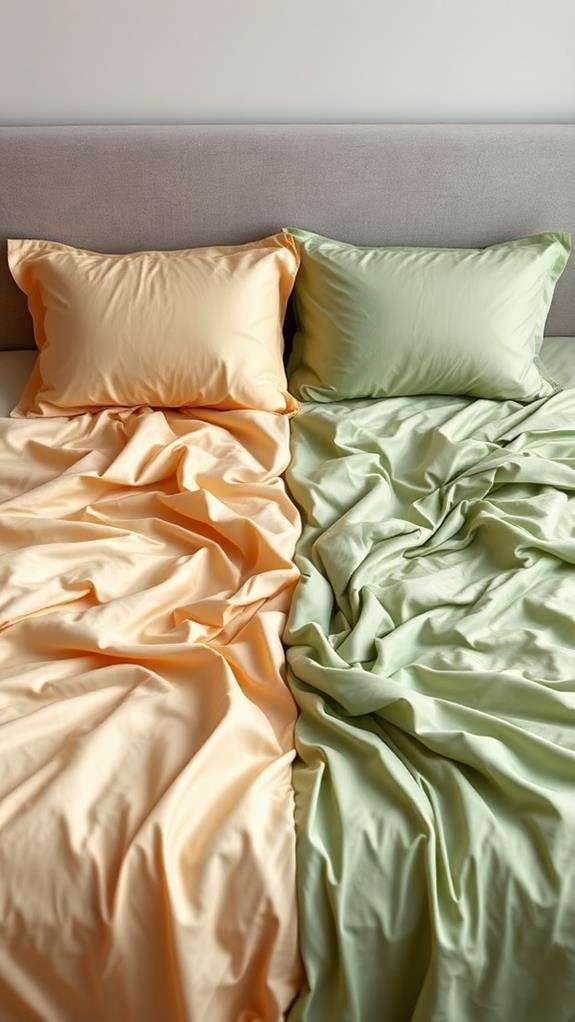
The ultimate comfort battle comes down to how bamboo and silk sheets stack up in promoting restful sleep. While both options provide luxurious comfort, bamboo sheets edge ahead with their superior breathability and moisture-wicking properties. You'll find that bamboo's natural antibacterial qualities help maintain a cleaner, fresher sleeping environment, which directly impacts your sleep quality.
Here's why bamboo sheets often lead to better sleep outcomes:
- They regulate your body temperature more effectively, preventing the discomfort of night sweats and overheating
- Their antibacterial properties reduce allergens that might disrupt your sleep
- The consistent softness through multiple washes guarantees long-lasting comfort
- Their breathable nature helps maintain ideal sleeping conditions throughout the night
While silk sheets offer undeniable smoothness, you might find yourself struggling with temperature regulation. The tight weave that makes silk so luxurious can also trap heat, potentially disrupting your sleep. If you're a hot sleeper or live in a warm climate, you'll appreciate how bamboo sheets maintain their comfort level while keeping you cool and dry throughout the night.
Durability and Longevity
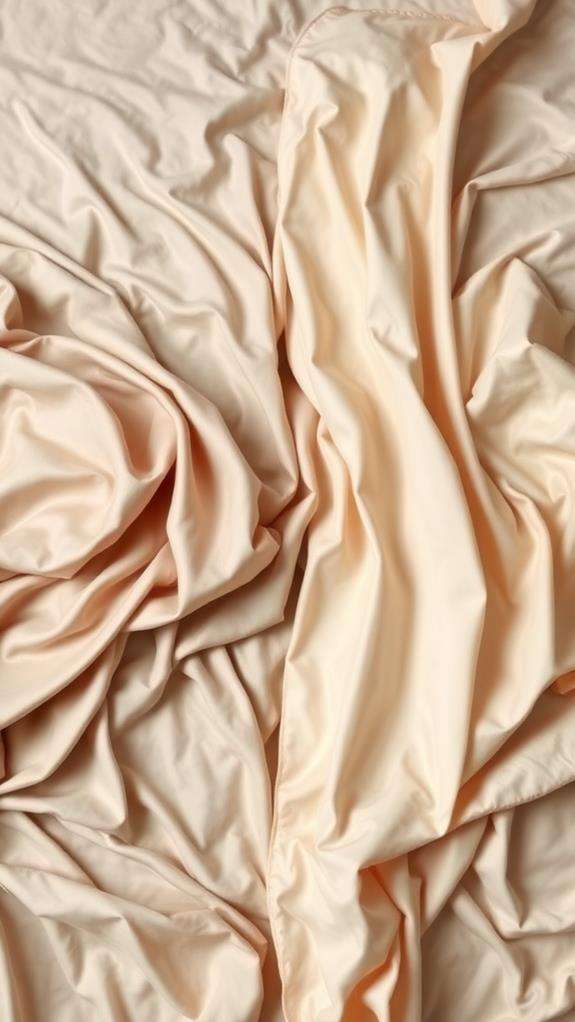
When investing in luxury bedding, durability becomes an essential factor in your decision-making process. The durability of bamboo sheets offers a considerable advantage over their silk counterparts, typically lasting 8 to 10 years with proper care. You'll find that bamboo fibers actually improve with age, becoming softer with each wash while maintaining their structural integrity.
In contrast, you'll need to replace silk sheets more frequently, as they're prone to various forms of damage. While silk's luxurious feel is undeniable, its delicate nature means you'll likely need new sheets after just a few years of regular use. The fabric's susceptibility to snags, tears, and stains can considerably reduce its longevity, even with careful handling.
When it comes to maintenance, you'll appreciate how bamboo sheets require less delicate care to maintain their durability. While you'll need to avoid hot water and harsh detergents, bamboo's robust nature makes it more forgiving than silk, which demands hand washing and exceptional care. This practical aspect of bamboo sheets means you're not just investing in immediate comfort but in long-term value as well.
Health and Wellness Advantages
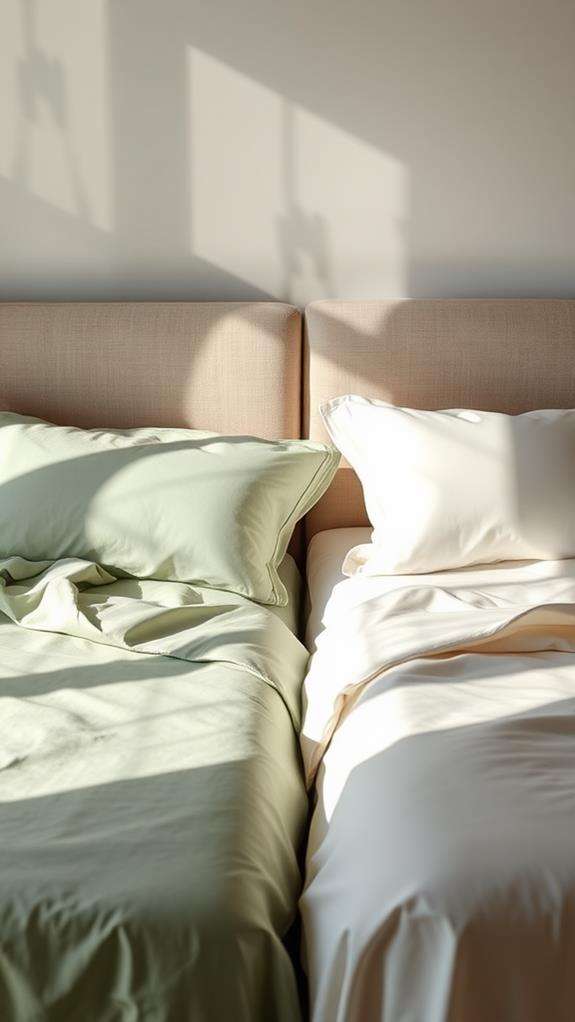
Comfort-conscious shoppers will find significant health benefits in both bamboo and silk sheets, though bamboo edges ahead with its impressive array of wellness features. When you're looking for bedding that promotes better health, bamboo sheets stand out with their natural hypoallergenic properties and superior moisture management capabilities.
While silk sheets offer notable benefits for your hair and skin, bamboo's inherent antibacterial qualities provide consistent protection against common allergens and irritants. You'll appreciate how bamboo's moisture-wicking abilities help maintain ideal humidity levels throughout the night, reducing the risk of skin issues and discomfort.
Here's what you'll experience with bamboo sheets compared to silk:
- Enhanced protection against dust mites and mold, particularly beneficial if you're prone to allergies
- Better temperature regulation throughout the night, helping you maintain uninterrupted sleep
- Consistent moisture control that keeps your skin properly hydrated
- Long-lasting hypoallergenic benefits that don't diminish over time
While both materials offer impressive wellness advantages, bamboo sheets maintain their health-promoting properties more effectively over time, making them an excellent choice for health-conscious consumers seeking long-term benefits from their bedding investment.
Frequently Asked Questions
Is Bamboo or Silk Better for Sheets?
Ever wondered why sleep experts are raving about bamboo? You'll find that bamboo sheets are the superior choice over silk. They're more durable, breathable, and won't break the bank. While silk might feel luxurious, bamboo's natural antibacterial properties and moisture-wicking abilities make it better for your nightly rest. You'll also appreciate that bamboo's eco-friendly nature and lower maintenance requirements make it a practical, sustainable choice for your bedroom.
What Is the Downside to Bamboo Sheets?
You'll find several drawbacks with bamboo sheets. They tend to wrinkle more easily than other fabrics, requiring extra care during washing and drying. While they're durable, lower-quality bamboo sheets can pill over time, affecting their appearance and comfort. Some manufacturing processes use harmful chemicals, which isn't eco-friendly. You might also notice they're less smooth than silk sheets, and their unique texture may take time to get used to.
Is Bamboo or Silk Better for Skin?
When it comes to skin health, bamboo sheets generally offer more extensive benefits. You'll find bamboo's natural antibacterial properties and moisture-wicking abilities help prevent skin irritation and breakouts, while keeping you dry throughout the night. Though silk's smooth texture can reduce friction and prevent creasing, bamboo's superior breathability and durability make it a better long-term choice for your skin, especially if you're prone to night sweats or have sensitive skin.
Is Bamboo or Silk More Breathable?
Picture yourself wrapped in silk, feeling luxurious until you're sweating like you're in a sauna. You'll find bamboo sheets are considerably more breathable than silk due to their micro-gap structure. While silk might feel cool initially, it'll trap heat against your body. In contrast, bamboo's natural fiber construction allows air to circulate freely, wicking away moisture and regulating your temperature. If you're a hot sleeper, bamboo's superior breathability makes it your best bet.





